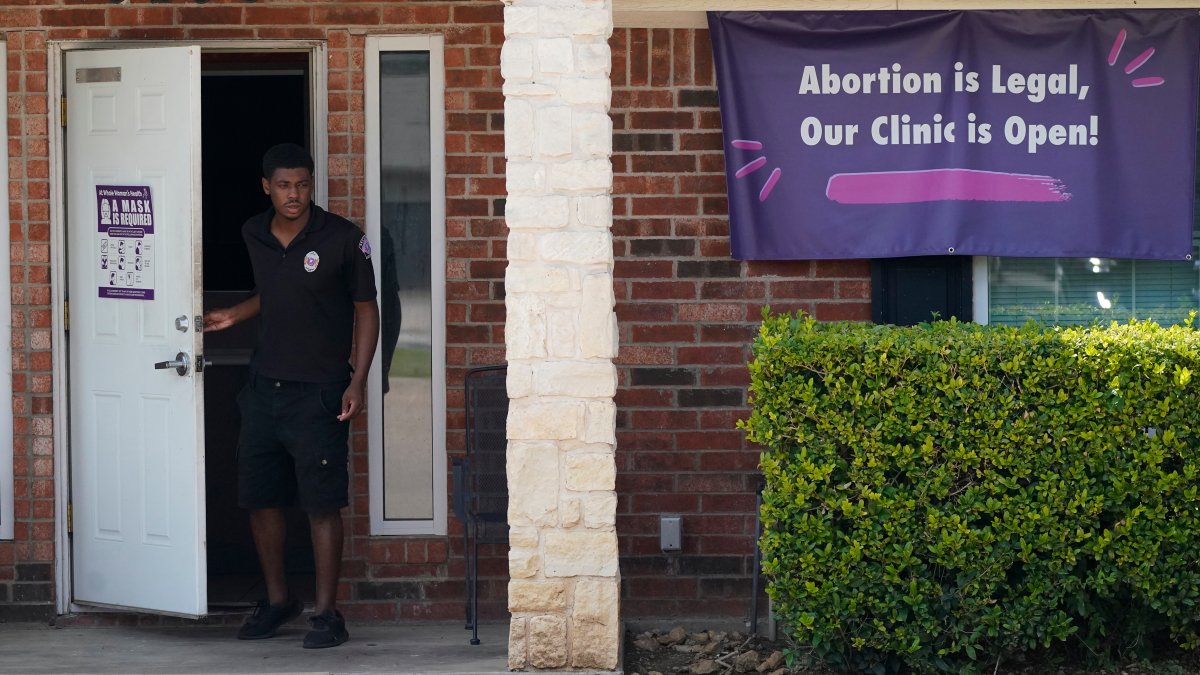‘Exactly What We Feared’ – NBC 5 Dallas-Fort Worth
A Texas woman traveled nearly 1,000 miles to Colorado for an abortion. Others drive four hours to New Mexico. And in Houston, clinics that typically perform more than 100 abortions per week are reduced to a few per day.
Two weeks after the nation’s strictest abortion law went into effect in Texas, new court records showed the deepening and rapid effects of the state’s near-total abortion ban. A federal judge scheduled a hearing on Wednesday October 1 about the Biden government’s efforts to block the bill known as Senate Law 8. A network of clinics in Texas that performed more than 9,000 abortions in 2020 said it has turned away from more than 100 patients to date.
“Since SB 8 went into effect on September 1, exactly what we feared has happened,” said Melaney Linton, president of Planned Parenthood Gulf Coast, in a court filing.
The law prohibits abortions once medical professionals can detect cardiac activity, which usually takes about six weeks, and before some women know they are pregnant. Enforcement is left to private individuals filing civil lawsuits against abortion providers, as well as others helping a woman in Texas obtain an abortion.
In the 10 days after the law went into effect, Linton said the Houston Planned Parenthood clinics had 63 patients scheduled for abortions, far fewer than the roughly 25 they would normally do in a single day alone. Eleven of these patients could not have abortions because cardiac activity was detected during their appointment.
A patient who was about five weeks pregnant had no cardiac activity but learned during her visit that she had COVID-19, which means that after a mandatory quarantine, she would have progressed too far in her pregnancy to have one in Texas Get an abortion, Linton said.
In Dallas, Dr. Allison Gilbert that 13 of her colleagues have been temporarily sent to a sister clinic in New Mexico to help an influx of Texan patients and that her own clinic will “inevitably” close unless the law is repealed soon.
Providers in neighboring countries reported growing backlogs among patients, which are increasingly difficult to cope with. At one planned parenthood clinic in Oklahoma City, more than 60% of the 219 appointments in the next two weeks are from Texas. Dr. Joshua Yap said one of the youngest patients was a Texan minor who was raped by a family member and was six weeks pregnant; the new Texas law makes no exceptions in cases of rape or incest.
Fund Texas Choice, a nonprofit that has been paying transportation for Texan women who can’t afford long travel expenses for an abortion for several years, told the court the number of callers had increased from about 10 a week to 10-15 daily . She estimates she will have spent at least $ 10,000 more than usual by October, and that donors have feared breaking the law by giving money to help patients with an abortion.
Abortion providers say they obey the law. Texas Right to Life, the state’s largest anti-abolition group that runs a guideline for suspected violations, claims it has received no credible reports that the law is not being followed.
“Texas Right to Life is not surprised at the Biden government’s desperate attempt to prevent the Texas Heartbeat Act from doing whatever it can to save lives as quickly as possible. We expect an impartial court to invalidate the DOJ’s lawsuit, ”said Elizabeth Graham. the vice president of the group.
A complete record of the decline in abortion in Texas – and how many women are now seeking them elsewhere – is not known. According to the Texas Health and Human Services Commission, more than 19,000 abortions had been reported in Texas as of April.
Abortion providers in neighboring and nearby states fear that with the recent surge in Texan patients, their own clinics, especially in the south, will not have enough capacity to handle the normal number of patients who would perform abortions in Texas.
The law came into effect after the Supreme Court rejected an urgency complaint from abortion providers asking for a stay.
Last week’s Justice Department’s original lawsuit argued that the law is invalid because it unlawfully violates the constitutional rights of women and violates the constitutional supremacy clause that states that federal law supersedes state law. The ministry argued similarly when it applied for an injunction or injunction late Tuesday.
“All the while, clinics in neighboring states are getting panicked calls from patients in Texas,” the department said.
Texas has about two dozen abortion clinics, but Dr. Bhavik Kumar, a medical officer at a Houston Planned Parenthood, said he feared that if a court doesn’t act soon, that number could fall. “This may mean clinics in Texas will be closed if this law stays in place for too long,” he said.
On Wednesday, two dozen attorneys general, all Democrats, told the court in a separate motion that a significant restriction on access to abortion in one state would put a strain on health systems elsewhere.
Under Texas law, a person could bring a lawsuit – even if they had no connection with the woman’s abortion – and could be eligible for at least $ 10,000 in damages if they prevail in court. It is the toughest abortion restriction in the US since the Supreme Court ruled Roe v. Wade confirmed in 1973 that women have a constitutional right to abortion.
Renae Eze, a spokeswoman for Republican Governor Greg Abbott, responded to the urgency request Wednesday by referring to her previous comments that they were confident the courts would uphold the law.
[ad_1]


